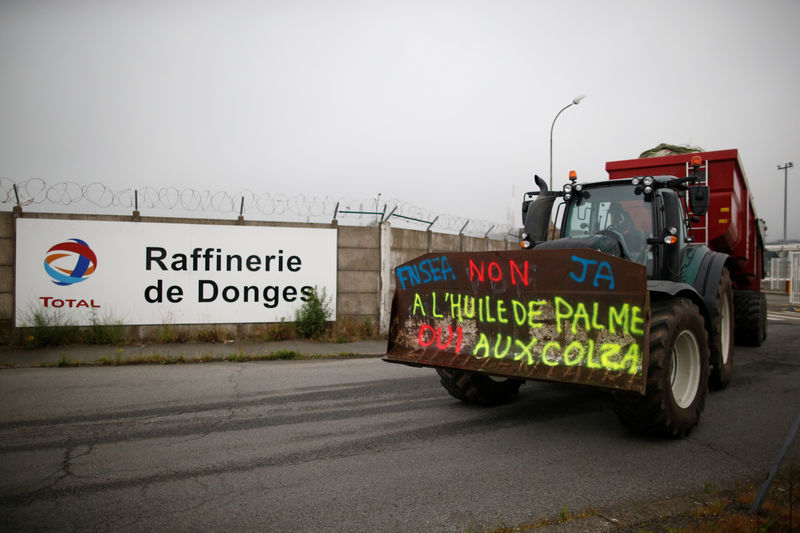By Bate Felix and Sybille de La Hamaide
PARIS (Reuters) - French farmers have blocked access to oil depots and refineries with tonnes of onions, wood and rubble, as part of a three-day protest over plans to allow Total (PA:TOTF) to use imported palm oil at a biofuel plant.
Farmers are concerned about the impact on locally produced oilseed crops, further souring relations between the EU's biggest agricultural sector and the government of President Emmanuel Macron.
Many welcomed Macron's call for fairer prices for farmers as part of a food chain review last year, but they have been angered by the government's attempt to phase out weedkiller glyphosate before other EU countries.
Farm Minister Stephane Travert said on Monday the farmers' blockades were illegal and the government would not rescind the decision to allow Total to use imported palm oil.
A total of 16 sites were blocked on Monday afternoon, France's largest farm union FNSEA (National Federation of Agricultural Holders' Unions) said on Twitter.
Total's 253,000 barrels-per-day (bpd) Gonfreville refinery and nearby oil depot, its 109,000 bpd Feyzin refinery, the 220,000 barrels-per-day (bpd) Donges refinery and 102,000 bpd Grandpuits refinery were among those blocked by farmers.
The oil and gas producer operates five refineries and nine petrol depots in France. It said on Monday morning the blockade by farmers had not had an impact on operations.
It urged clients not to rush to petrol stations to fill their tanks, which could spark panic buying and shortages.
French authorities last month gave Total permission to use palm oil as a feedstock at its La Mede biofuel refinery in southern France, infuriating farmers who grow crops such as rapeseed. Environmentalists also blame palm oil cultivation for deforestation in southeast Asia.
The mostly symbolic blockade at La Mede was lifted around midday with farmers returning to work, according to a Reuters photographer on site.
Organisers say the farmers' blockades are aimed at pressuring the government into curbing palm oil use at La Mede and to address other grievances such as imports of South American meat.
"Our target is the state," FNSEA's Lambert said, adding Total's decision on palm oil was "the last straw".
Widespread fuel shortages were not expected, however, given France's network of seven refineries, 200 fuel depots, emergency fuel reserves, and the absence of sympathy action by fuel sector workers.
Palm oil is cheaper than rapeseed oil as a feedstock for biodiesel. French farmers say its growing use has added to their competitive disadvantage because of high taxes and strict environmental regulations in France.
Total argues its plans call for using less palm oil than allowed by the authorities, offer an outlet for local rapeseed and will develop large-scale recycling of used oil and fat.
Palm oil has been criticised in Europe for environmental destruction and some lawmakers are pushing for a ban on its use in biofuel as part of new European Union energy targets.
France has said it would oppose a full EU ban but junior ecology minister Sebastien Lecornu said on Monday Paris wanted to cap and progressively cut palm oil imports.

The issue of palm oil use has caused friction with Indonesia and Malaysia, the two largest palm oil producers, with Malaysian officials warning of trade repercussions that could affect a potential deal to buy French fighter jets.